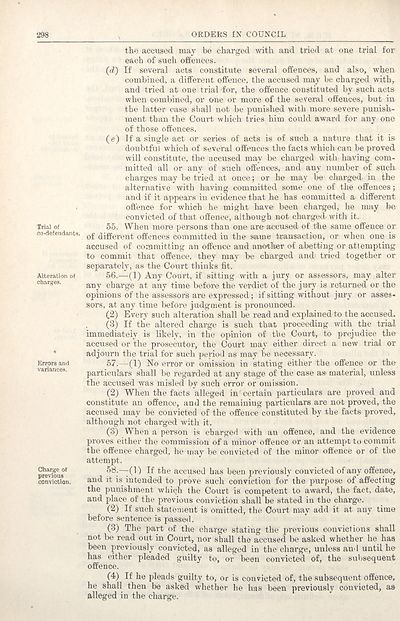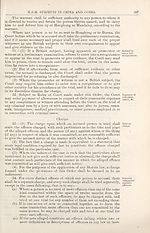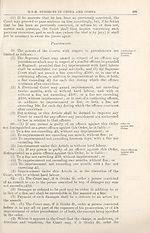1918
(366) Page 298
Download files
Complete book:
Individual page:
Thumbnail gallery: Grid view | List view

ORDERS IN COUNCIL
the accused may be charged with and tried at one trial for
each of such offences.
(d) If several acts constitute several offences, and also, when
combined, a different offence, the accused may be charged with,
and tried at one trial for, the offence constituted by such acts
when combined, or one or more of the several offences, but in
the latter case shall not be punished with more severe punish¬
ment than the Court which tries him could award for any one
of those offences.
(e) If a single act or series of acts is of such a nature that it is
doubtful which of several offences the facts which can be proved
will constitute, the accused may be charged with, having com¬
mitted all or any of such offences, and any number of such
charges may be tried at once; or he may be charged, in the
alternative with having committed some one of the offences;
and if it appears in evidence that he has committed a different
offence for which he might have been charged, he may be
convicted of that offence, although not charged, with it.
Trial of 55. When more persons than one are asccused of the same offence or
co-defendants. 0£ different offences committed in the same transaction, or when one is
accused of committing an offence and another of abetting or attempting
to commit that offence, they may be charged and tried together or
separately, as the Court thinks fit.
Alteration of 56.—(1) Any Court, if sitting with a jury or assessors, may alter
charges. any charge at any time before the verdict of the jury is returned or the
opinions of the assessors are expressed; if sitting without jury or asses¬
sors, at any time before judgment is pronounced.
(2) Every such alteration shall be read and explained to the accused.
(3) If the altered charge is such that proceeding with the trial
immediately is likely, in the opinion of the Court, to prejudice the
accused or the prosecutor, the Court may either direct a new trial or
’ adjourn the trial for such period as may be necessary.
Errors and 57.—(1) No error or omission in stating either the offence or the
variances. particulars shall be regarded at any stage of the case as- material, unless
the accused was misled by such error or omission.
(2) When the facts alleged in certain particulars are proved and
constitute an offence, and the remaining particulars are not proved, the
accused may be convicted of the offence constituted by the facts proved,
although not charged with it.
(3) When a person is charged with an offence, and the evidence
proves either the commission of a minor offence or an attempt to commit
the offence charged, he may be convicted of the minor offence or of the
attempt.
Serious* ^ the accused has been previously convicted of any offence,
conviction. and it is intended to prove such conviction for the purpose of affecting
the punishment which the Court is competent to award, the fact, date,
and place of the previous conviction shall be stated in the charge.
(2) If such statement is omitted, the Court may add it at any time
before sentence is passed.
(3) The part of the charge stating the previous convictions shall
not be read out in Court, nor shall the accused be asked whether he has
been previously convicted, as alleged in the charge, unless and until he
has either pleaded guilty to, or been convicted of, the subsequent
offence.
(4) If he pleads guilty to, or is convicted of, the subsequent offence,
he shall then be asked whether he has been previously convicted, as
alleged in the charge.
the accused may be charged with and tried at one trial for
each of such offences.
(d) If several acts constitute several offences, and also, when
combined, a different offence, the accused may be charged with,
and tried at one trial for, the offence constituted by such acts
when combined, or one or more of the several offences, but in
the latter case shall not be punished with more severe punish¬
ment than the Court which tries him could award for any one
of those offences.
(e) If a single act or series of acts is of such a nature that it is
doubtful which of several offences the facts which can be proved
will constitute, the accused may be charged with, having com¬
mitted all or any of such offences, and any number of such
charges may be tried at once; or he may be charged, in the
alternative with having committed some one of the offences;
and if it appears in evidence that he has committed a different
offence for which he might have been charged, he may be
convicted of that offence, although not charged, with it.
Trial of 55. When more persons than one are asccused of the same offence or
co-defendants. 0£ different offences committed in the same transaction, or when one is
accused of committing an offence and another of abetting or attempting
to commit that offence, they may be charged and tried together or
separately, as the Court thinks fit.
Alteration of 56.—(1) Any Court, if sitting with a jury or assessors, may alter
charges. any charge at any time before the verdict of the jury is returned or the
opinions of the assessors are expressed; if sitting without jury or asses¬
sors, at any time before judgment is pronounced.
(2) Every such alteration shall be read and explained to the accused.
(3) If the altered charge is such that proceeding with the trial
immediately is likely, in the opinion of the Court, to prejudice the
accused or the prosecutor, the Court may either direct a new trial or
’ adjourn the trial for such period as may be necessary.
Errors and 57.—(1) No error or omission in stating either the offence or the
variances. particulars shall be regarded at any stage of the case as- material, unless
the accused was misled by such error or omission.
(2) When the facts alleged in certain particulars are proved and
constitute an offence, and the remaining particulars are not proved, the
accused may be convicted of the offence constituted by the facts proved,
although not charged with it.
(3) When a person is charged with an offence, and the evidence
proves either the commission of a minor offence or an attempt to commit
the offence charged, he may be convicted of the minor offence or of the
attempt.
Serious* ^ the accused has been previously convicted of any offence,
conviction. and it is intended to prove such conviction for the purpose of affecting
the punishment which the Court is competent to award, the fact, date,
and place of the previous conviction shall be stated in the charge.
(2) If such statement is omitted, the Court may add it at any time
before sentence is passed.
(3) The part of the charge stating the previous convictions shall
not be read out in Court, nor shall the accused be asked whether he has
been previously convicted, as alleged in the charge, unless and until he
has either pleaded guilty to, or been convicted of, the subsequent
offence.
(4) If he pleads guilty to, or is convicted of, the subsequent offence,
he shall then be asked whether he has been previously convicted, as
alleged in the charge.
Set display mode to:
![]() Universal Viewer |
Universal Viewer | ![]() Mirador |
Large image | Transcription
Mirador |
Large image | Transcription
Images and transcriptions on this page, including medium image downloads, may be used under the Creative Commons Attribution 4.0 International Licence unless otherwise stated. ![]()
| Asian directories and chronicles > 1918 > (366) Page 298 |
|---|
| Permanent URL | https://digital.nls.uk/194898088 |
|---|
| Attribution and copyright: |
|
|---|---|
| Description | Volumes from the Asian 'Directory and Chronicle' series covering 1917-1941, but missing 1919 and 1923. Compiled annually from a multiplicity of local sources and research. They provide listings of each country's active corporations, foreign residents and government agencies of all nationalities for that year, together with their addresses. Content includes: various treaties; coverage of conflicts; currencies and taxes; consular fees; weights and measures; public holidays; festivals and traditions. A source of information for both Western states and communities of foreigners living in Asia. Published by Hongkong Daily Press. |
|---|---|
| Shelfmark | H3.86.1303 |
| Additional NLS resources: |

